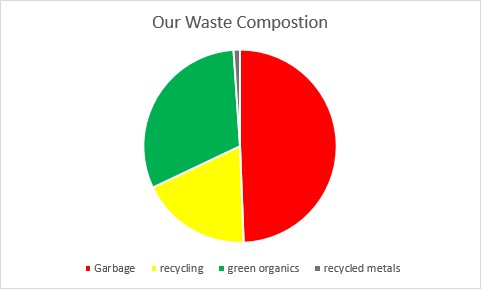We are one of NSW's best recyclers, diverting almost 50% of our waste from landfill.

We also have one of the lowest contamination rates in NSW for recycling and garden organic waste. Our residents really do their bit to be proactive recyclers and treat waste responsibly - and they have told us they are keen and ready to do even more to protect our beautiful environment.
The NSW Government has set all Councils a target of 80% diversion of household waste from landfill by 2030. We are already at 50% so we only have 30% to go.
To meet this target, we have adopted a new Waste Strategy, setting out in practical steps, how we can work together to achieve a further 30% waste reduction in household waste.
We will be launching our action plan soon, but what can we be doing now?
Food Waste
30% of our red lid bin is made up of food waste. To divert food waste from landfill lets:
- composting improves soil, reduces waste to landfill and reduces Greenhouse Gas (GHG) emissions.
- we run free compost and worm farm workshops for our residents. Residents attending a workshop can select a compost bin or worm farm at the end of the workshop. See Waste Wise Workshops for upcoming events.
- households can also receive up to 50% off a worm farm, bokashi or compost bin through our partnership with Compost Revolution.
- reduce your food waste by meal planning, freezing leftovers and storing food to last.
- we run free workshops for our residents to learn practical tips for reducing food waste. See Waste Wise Workshops for upcoming events.
We are committed to delivering a combined Food Organics and Garden Organics service (FOGO) to households as soon as possible and no later than 2030 to meet NSW Government targets. For such a significant change in waste and resource management practices it is critical that Council responsibly manage the financial, social and environmental impacts associated with a FOGO service introduction to make it a long term success.
Council’s ability to implement a FOGO service is currently limited by the lack of infrastructure capacity within the Sydney area to receive and/or process our Food and Garden Organics. To responsibly provide the FOGO service, a feasibility study is being conducted, ensuring that we get it right the first time to protect the interests of our community and the environment. The limited processing facilities available within a practical distance from the Sutherland Shire represents a significant challenge as our aim is to manage our waste locally which is important to support the circular economy.
We aim to roll out FOGO to all households including multi unit dwellings. The feasibility study will inform us on how this is best delivered and when. For example, the service might be food only for some multi unit dwellings currently without green bins. Some other Councils have already launched FOGO and we are benefiting from understanding what worked well for them and what didn’t. As we progress we will be keeping our residents informed of our plans on delivering a FOGO service, and making sure that our community is involved and has their say along the way.
Packaging
23% of our red lid bin is packaging. To divert packaging from landfill lets:
- soft plastics can be collected through our partnership with RecycleSmart from your doorstep (a small fee applies). These soft plastics are recycled into synthetic oils that are reused to make other plastics.
- blister packs can be collected through our partnership with RecycleSmart from your doorstep (a small fee applies). These are recycled by Pharmacycle, where the aluminium and plastic components are separated and reused.
- where possible, choose products with little or no packaging, or packaging that can composted.
- take your own containers and reusable bags when shopping or eating out.
Textiles
Around 4% of our red lid bin is made up of textiles. To divert textiles from landfill lets:
- unwanted textiles can be collected through our partnership with RecycleSmart from your doorstep (a small fee applies).
- take your unwanted textiles to clothing bins located within the Sutherland Shire for recycling. Some retailers even have recycling bins in store.
- donate unwanted (good quality) clothes, shoes and bags to charity
- repurpose items to give them a new life
- consider before buying - could it be rented or bought second hand instead?